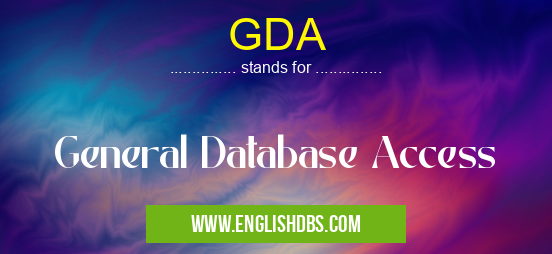What does GDA mean in DATABASES
GDA stands for General Database Access. It is a library or module that provides a generic interface to access and manipulate databases. It allows developers to interact with databases from different vendors and platforms using a unified set of commands.

GDA meaning in Databases in Computing
GDA mostly used in an acronym Databases in Category Computing that means General Database Access
Shorthand: GDA,
Full Form: General Database Access
For more information of "General Database Access", see the section below.
Main Features
- Portability: GDA enables developers to write database-independent code that can be used across different database systems.
- Abstraction: It provides an abstraction layer between the application and the underlying database, hiding the complexities of specific database implementations.
- Consistency: GDA ensures consistent behavior when accessing databases from various vendors, eliminating the need to learn specific database syntax and commands.
- Efficiency: By optimizing database queries and connections, GDA improves application performance.
Benefits
- Reduced Development Time: GDA simplifies database access, allowing developers to focus on business logic instead of database-specific details.
- Improved Maintainability: Database-independent code is easier to maintain and update, as changes in database vendors or platforms do not require code modifications.
- Enhanced Scalability: GDA supports high-performance database access, enabling applications to handle large volumes of data and concurrent users.
Essential Questions and Answers on General Database Access in "COMPUTING»DB"
What is General Database Access (GDA)?
GDA is an open-source software framework that provides a unified interface for accessing and manipulating data from multiple relational database management systems (RDBMSs). It simplifies the process of connecting to and interacting with different databases, allowing developers to write code that is independent of the underlying database technology.
What are the benefits of using GDA?
GDA offers several benefits, including:
- Database Independence: Enables developers to write code that can connect to and interact with different database systems without modifying the code.
- Simplified Data Access: Provides a consistent API for accessing data, reducing the need for complex SQL queries and simplifying database operations.
- Improved Performance: Optimizes data access by automatically selecting the most efficient database connection and execution method based on the underlying database technology.
- Enhanced Security: Implements security measures to protect data from unauthorized access and malicious attacks.
What database systems does GDA support?
GDA currently supports a wide range of relational database systems, including:
- MySQL
- PostgreSQL
- Oracle
- Microsoft SQL Server
- IBM DB2
- SQLite
- MariaDB
How do I install and use GDA?
GDA can be installed using a package manager or by downloading the source code from the official website. Once installed, developers can use the GDA API to connect to databases, execute queries and updates, and retrieve data. Comprehensive documentation and tutorials are available to guide developers through the installation and usage process.
Is GDA suitable for large-scale database applications?
Yes, GDA is designed to handle large-scale database applications with high performance and scalability. It incorporates advanced features such as connection pooling, load balancing, and failover mechanisms to ensure reliable and efficient data access in complex environments.
Final Words: GDA is a powerful tool that streamlines database access and enhances the productivity of developers. It provides a generic interface, ensuring portability, abstraction, and consistency across various database systems. By leveraging GDA, applications can achieve faster development, improved maintainability, and increased scalability.
GDA also stands for: |
|
| All stands for GDA |
